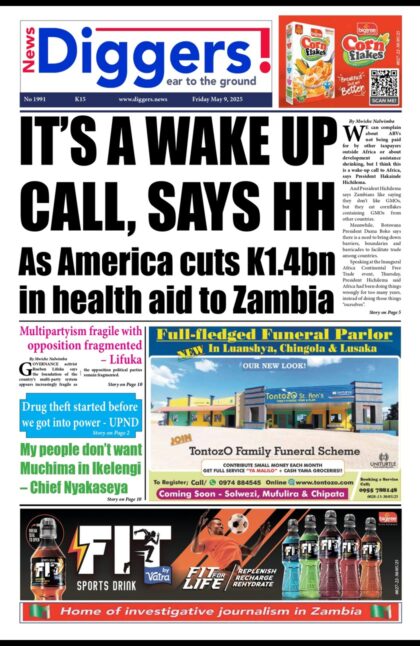The Copperbelt Energy Corporation says Mopani Copper Mines poses a risk to the sustainability of the energy sector as it is the only customer refusing to pay the new revised electricity tariffs.
And CEC says the Kitwe High Court has thrown out an injunction Mopani had obtained against power restriction for irregularities.
Yesterday, Mopani Public Relations Manager Nerbet Mulenga announced that the mine had no choice but to retrench about 4,700 employees due to the power tariff standoff with CEC.
Mulenga also accused CEC of breaching the Power Supply Agreement.
But in a statement sent to News Diggers! yesterday, CEC Senior Manager Corporate Communication Chama Nsabika said it was unfortunate the Mopani was the only customer refusing to pay the revised tariffs.
“The action to restrict supply was necessitated by MCM’s refusal to accept the 2017 tariff increment despite negotiations that began in November 2016 involving CEC, its main supplier of power, ZESCO Limited (ZESCO), and all of CEC’s mine customers. To date, MCM remains the only CEC customer refusing to pay the 2017 industry wide tariff. CEC wishes to state that under the Power Supply Agreement (PSA) with MCM, there is provision for negotiated and industrywide tariff revisions,” Nsabika stated.
“In this process, CEC wishes to state that it fully supports the critical requirement for this country to effect a cost-reflective tariff regime to all customer categories. Tariffs to all customer categories in Zambia are being increased during 2017 as a first step to moving towards cost-reflective levels to phase out subsidies that have been provided to the sector over the years and which are not economically sustainable for the country. It is, therefore, important that all players show appreciation for the general direction the country is taking and contribute their fair share to this process.”
She also stated that the restriction of power supply only affected the smelter and no underground operations as claimed by Mopani.
“On 11th August, 2017 the Copperbelt Energy Corporation Plc (CEC) effected a restriction of power supply to Mopani Copper Mines PLC (MCM) to 94MW from their normal uptake of 130MW. This is a reduction of up to 36MW, equating to about 28% of MCM’s normal supply. The restriction remains in place. The load reduction affected only the smelter and no underground operations, or indeed any other operation, were affected. Conscious of the need to maintain human and plant safety, all the requisite safety procedures have been observed throughout the restriction process,” Nsabika stated.
She further stated that the energy firm had been left with no other option to help Mopani as they had rejected all solutions thus far.
“During the period of restriction, CEC has remained committed to resolving the matter amicably and to return to the normal supply situation; and has in this vein, held several discussions with MCM aimed at resolving the situation. CEC even offered MCM an option to provide them with power from alternative sources in the interim as a way of meeting their full requirements while the parties worked to resolve the current impasse. It is unfortunate that MCM still rejected this offer. Under the circumstances, CEC has been left with no other option through which it can help MCM without any constructive engagement from their side,” Nsabika stated.
“It must be pointed out that the desired resolution cannot be achieved to the detriment of the Zambian energy sector and the Company’s sustainability. Eight months after the implementation of the new tariff, outstanding amounts due from MCM have escalated, making it unsustainable for both CEC and ZESCO to continue supplying MCM with their full power requirements. With all the other mines having agreed to paying at the new rate, MCM’s attitude, unfortunately, poses a serious threat of undoing the progress that has been nationally achieved and risks taking the country back to a position where it cannot sustain its energy sector, which would adversely impact the whole economy.”
She stated that CEC was saddened by the unfortunate situation created by Mopani.
“The sustainability of the Zambian energy sector and that of the respective players in the sector is underpinned by providing services at cost-reflective levels. The Zambian energy sector has over the last 24 months experienced various challenges and in responding to these challenges, several interventions have been undertaken; all of which have changed the cost base for the sector. This includes the cost of imported power and new generation plants in Zambia, which are significantly more expensive than power from traditional and/or legacy sources. This, among other factors, has necessitated the need to review tariffs in order to allow for a sustainable power sector. The 2017 tariffs, from a sector perceptive, impacted on all customer categories with no exception,” she said.
“CEC remains committed to a viable and sustainable power sector in Zambia. CEC further commits itself to continue discharging its obligations and to provide reliable services to all its customers. CEC wishes to reiterate that it is saddened by this very unfortunate situation created by MCM and remains hopeful that the two Management teams will work together to conclusively resolve this avoidable standoff; for the good of the mining sector, the economy and the country as a whole.”
She also announced that the Kitwe High Court yesterday threw out an injunction Mopani had obtained against the energy firm.
“CEC further wishes to state that the interim injunction obtained by MCM in the Kitwe High Court was today, Tuesday 22nd August 2017, discharged following a successful challenge by CEC and ZESCO for irregularity,” stated Nsabika.


















